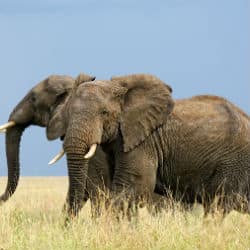Elephant Poaching Starting To Decline In Some Parts Of Africa

The illegal poaching of African elephants which has grown rapidly since 2006 seems to be slowing down and may even be decreasing. According to two new reports, the number of elephants being slaughtered for their ivory has declined. The picture in Central and West Africa however is mixed and poaching shows no sign of moderating. Some experts reckon the reason behind the decline in poaching is there are fewer elephants alive.
New data
There is new data on the sources of elephant poaching from the Convention on the International Trade in Endangered Species of Wild Fauna and Flora which is more commonly referred to as Cites. The organisation runs two elephant monitoring records that are considered to be reliable indicators of what is actually happening on the ground. A couple of months ago the programme called Mike (Monitoring the Illegal Killing of Elephants) found that the number of deaths which started to spike in 2006 actually peaked in 2011. Despite the fact that the trend is moving in the right direction, well over 14,000 elephants were poached between 2003 and 2015.
Levels are different across the continent
Southern Africa is the part of the continent where poaching levels have remained at the lowest. It continues to be the only sub-region were illegal killings have not exceeded natural deaths since monitoring first started. Poaching however still remains high. East Africa has also seen a fall in poaching for the fourth consecutive year. Central and West Africa are where the most significant levels of poaching take place, with illegal killings far exceeding natural deaths.
Elephant populations have fallen
Cites secretary general says there are some encouraging signs including a decline in the overall upward trend of poaching in some parts of the African continent. He adds that this shows what is possible when all stakeholders make a sustained effort backed by strong political support. Others claim that we should not take much comfort in the relative stability of the new figures. Experts say that it needs to be understood that whilst poaching levels may be down, in some cases this is because populations have been severely depleted. For example, In Central Africa, the elephant population has fallen by 70 per cent so whilst you may see poaching stabilise or decrease, this is because elephants are harder to find.



